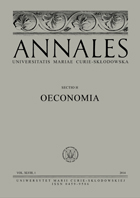Algorithmic Human Resources Management – Perspectives and Challenges
Algorithmic Human Resources Management – Perspectives and Challenges
Author(s): Łukasz SienkiewiczSubject(s): Economy, Human Resources in Economy, ICT Information and Communications Technologies
Published by: Wydawnictwo Naukowe Uniwersytetu Marii Curie-Sklodowskiej
Keywords: human resources management; HR analytics; algorithms; HRM ethics
Summary/Abstract: Theoretical background: Technology – most notably processes of digitalisation, the use of artificial intelligence, machine learning, big data and prevalence of remote work due to pandemic – changes the way organizations manage human resources. One of the increasing trends is the use of so-called “algorithmic management”. It is notably different than previous e-HRM or HRIS (human resources information systems) applications, as it automates HR-related duties. Algorithms, being autonomous computational formulae, are considered objective and mathematically correct decision making mechanisms. Limiting human involvement and oversight of the labour process might lead to serious ethical and managerial challenges. Many areas – previously being sole responsibility of managers (including HR managers), like employment relations, hiring, performance management, remuneration – are increasingly affected, or even taken over, by algorithmic management.Purpose of the article: The purpose of this article is to review the development, perspectives and challenges (including possible biases and ethical considerations) of algorithmic human resources management. This novel approach is fuelled by the speeding processes of digitalisation, the use of artificial intelligence, big data and increased analytical capabilities and applications used by contemporary companies. Algorithms are formulas that autonomously make decisions based on statistical models or decision rules without human intervention. Therefore, the use of algorithmic HRM automates decision-making processes and duties of human resources managers, thereby limiting human involvement and oversight, which can have negative consequences for the organization.Research methods: The article provides a critical literature review of theoretical sources and empirical evidence on the application of algorithmic human resources management practices. Scientific journals in the field of human resources management and technology applications have been reviewed, as well as research reports from academic institutions and renowned international organizations.Main findings: Applications of algorithmic human resources management are an emerging field of study that is currently not extensively researched. Little is known about the scale of use as well as consequences of this more automated approach to manage human work. Scarce evidence suggests possible negative consequences, including ethical concerns, biases leading to discriminatory decisions and adverse employees’ reactions to decisions based on algorithms. After the review of possible future developments and challenges connected to algorithmic HRM, this article proposed actions aimed at re-humanisation of the approach to managerial decision-making with the support of algorithms, ensuring transparency of the algorithms construction and functionalities, and increasing reliability and reduction of possible biases.
Journal: Annales Universitatis Mariae Curie-Skłodowska, Sectio H Oeconomia
- Issue Year: LV/2021
- Issue No: 2
- Page Range: 95-105
- Page Count: 11
- Language: English

